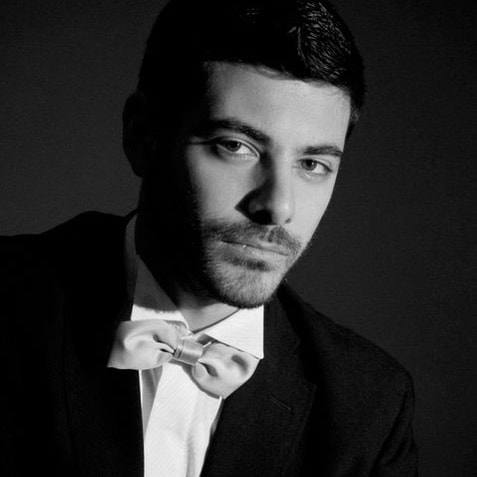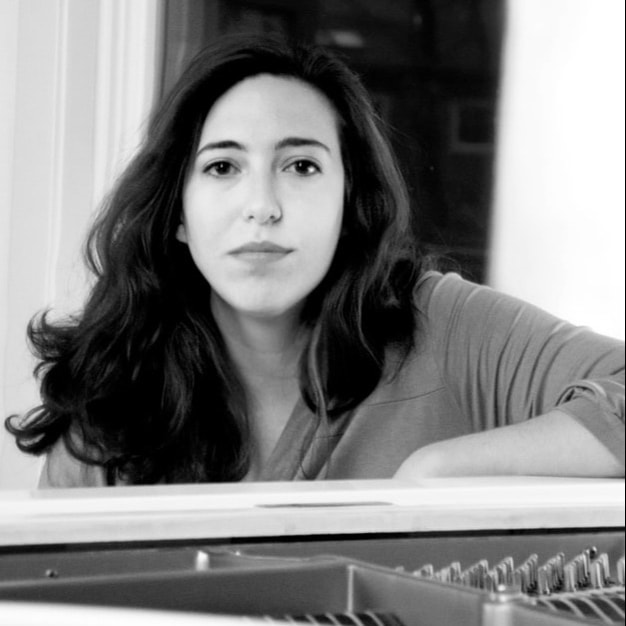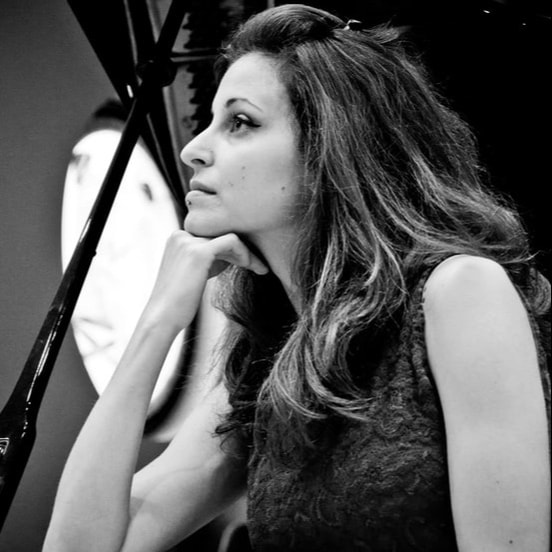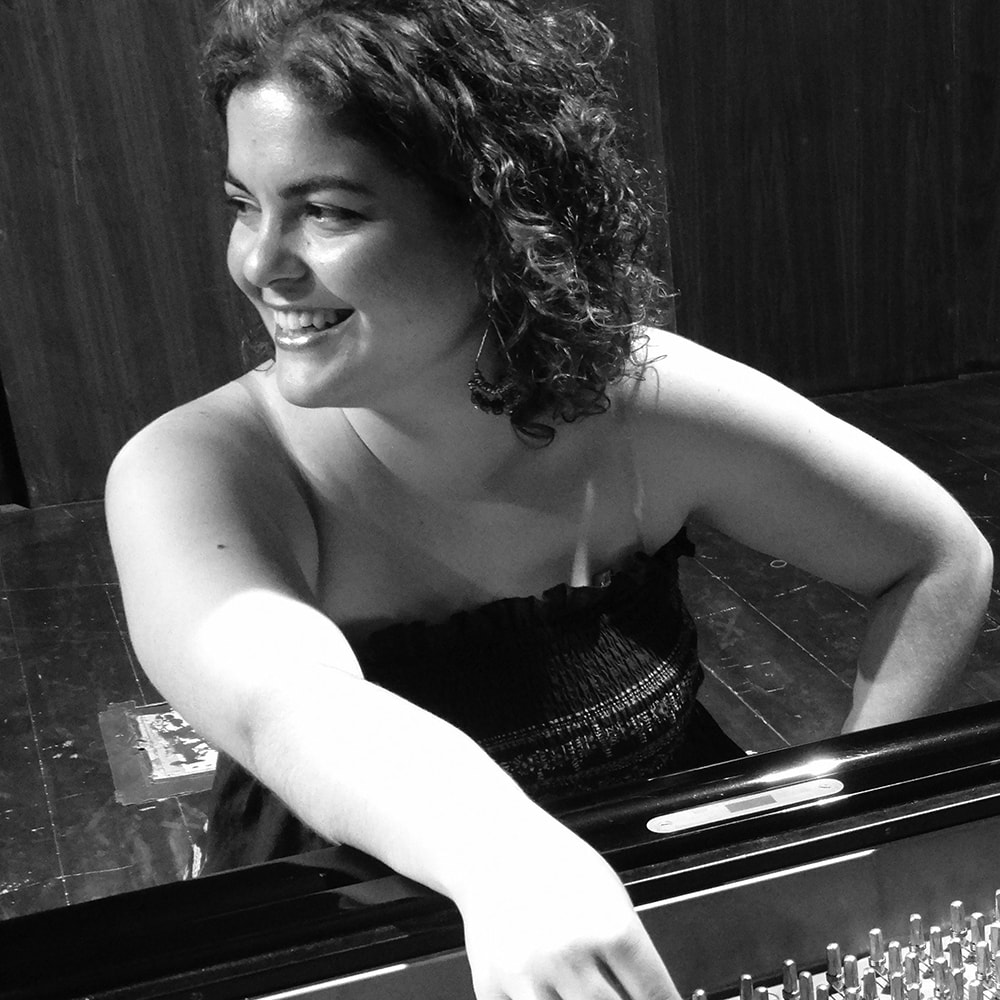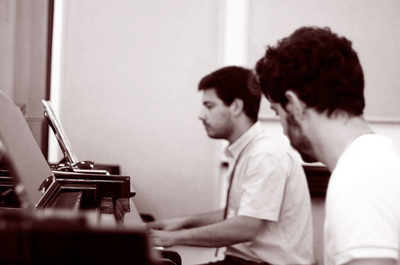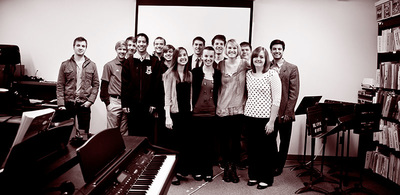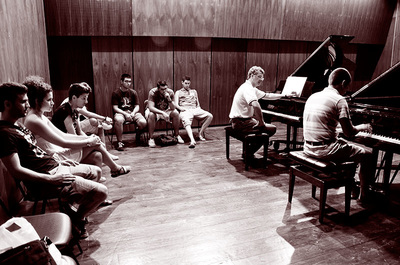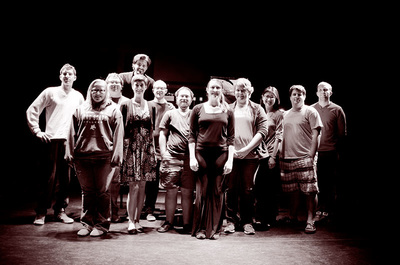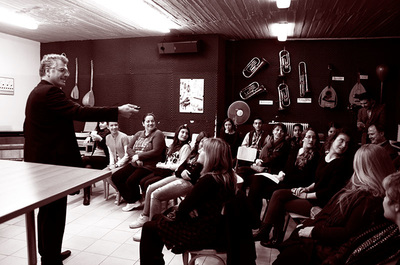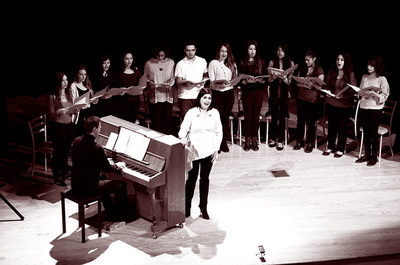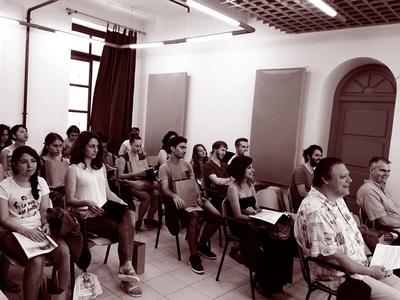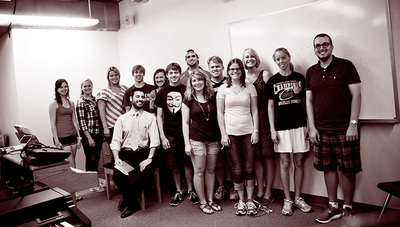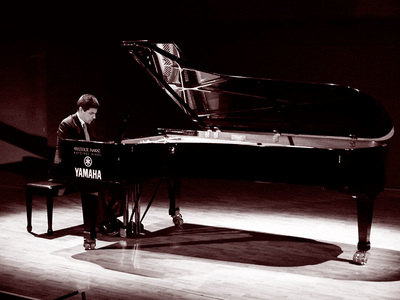ΤΟ ΠΡΟΓΡΑΜΜΑ AMERICAN PIANO SCHOOL project
ΜΑΘΗΜΑΤΑ ΠΙΑΝΟΥ
& ΘΕΩΡΗΤΙΚΩΝ
≅ Ιδιαίτερα μαθήματα όλων των τάξεων πιάνου
≅ Μουσική προπαιδεία
≅ Πιανιστική πρακτική
≅ Ειδικό πρόγραμμα εκμάθησης για ενήλικες
≅ Προγράμματα εκμάθησης σε group
≅ Master-classes
≅ Μουσική Θεωρία
≅ Αρμονία
≅ Ιστορία της μουσικής
≅ Προετοιμασία για εισαγωγικές εξετάσεις μουσικών πανεπιστημίων
Ολοκληρωμένο πρόγραμμα σπουδών σε συνεργασία με ωδεία αναγνωρισμένα από το κράτος
Η ιδέα του American Piano School Project στην Ελλάδα, έρχεται να καλύψει δύο βασικές ανάγκες στον τομέα της μουσικής εκπαίδευσης. Πρώτον το υψηλό κόστος των ωδείων στα οποία οι γονείς καλούνται να πληρώσουν υψηλά δίδακτρα για λιγότερες ώρες διδασκαλίας και δεύτερο και κυριότερο την απαρχαιομένη διδασκαλία του πιάνου και των θεωρητικών η οποία δεν έχει ανανεωθεί από το βασιλικό διάταγμα του 1957 και μετά βίας ακολουθείται από ελάχιστα, δυστυχώς αδιαβάθμιτα, ωδεία στην Ελλάδα. Το American Piano School είναι μια ιδέα και ένα πρόγραμμα το οποίο αναμιγνύει τις πιο σύγχρονες αμερικάνικες παιδαγωγικές μεθόδους διδασκαλίας του πιάνου με το Ελληνικό πρόγραμμα μουσικών σπουδών προτείνοντας έτσι μια σύγχρονη, ολοκληρωμένη και πάνω απ᾽ όλα δραστική μουσική εμπειρία. Βασικό χαρακτηριστικό αυτής της ‘σχολής’ είναι ο συνδιασμός πολλών μουσικών δραστηριοτήτων και κλάδων μέσα στη διδακτική ώρα όπως θεωρία, σολφέζ, ιστορία της μουσικής κ.α. με σκοπό τη δημιουργία μιας υγειούς μουσικής αντίληψης. Η μουσική ρητορική, η αντίληψη του βάρους, η σωστή χρήση του σώματος, η μουσική δωματίου και η συνεχής ανάπτυξη της πιανιστικής ερμηνείας σε συνδιασμό με το πρωταρχικό μας μουσικό όργανο, την ανθρώπινη φωνή, είναι μερικά από τα βασικά στοιχεία που συνθέτουν μοναδική μουσική εμπειρία μέσω της διδασκαλίας του προγράμματος.
Ανδρέας Ξενόπουλος - Συντονιστής του προγράμματος:
Διδάκτωρ της Μουσικής Σχολής Glenn Korff του Πανεπιστημίου της Νεμπράσκα-Λινκολν των Ηνωμένων Πολιτειών, ο Έλληνας πιανίστας Ανδρέας Ξενόπουλος δίνει ετησίως δεκάδες συναυλίες στην Ελλάδα και το εξωτερικό (Ευρώπη, Αμερική, Ασία). Μέσα από την αυξανόμενη παρουσία του στο χώρο της μουσικής εκπαίδευσης παραδίδει ετησίως Master Classes σε Ελλάδα και εξωτερικό και πολλοί μαθητές εξελίσσονται μουσικά υπό την καθοδήγησή του. Από το 2002 μέχρι σήμερα έχει συνθέσει μουσική για τρεις θεατρικές παραστάσεις, έργα για σόλο πιάνο καθώς και ένα κοντσέρτο για πιάνο και ορχήστρα. Από το 2009 είναι ιδρυτής και πρόεδρος του διεθνούς φεστιβάλ Piano Plus Festival στην Αθήνα καθώς και συντονιστής του Διεθνούς Θερινού Ινστιτούτου Πιάνου στην Κέρκυρα.
Έχει παρακολουθήσει δεκάδες διεθνή σεμινάρια με αναγνωρισμένους πιανίστες, συμπεριλαμβανομένων των Hideyo Harada (Japan), Kemal Gekic (University of Maiami), Maxim Mogilewsky, Svetlana Smolina, Eri Nakagawa (Mahidol University of Thailand), Eduard Zilberkant (University of Fairbanks, Alaska) και πολλούς άλλους. Έχει αναγνωριστεί από πολλούς διεθνείς διαγωνισμούς στην πιανιστική ερμηνεία.
Το 2009 ολοκλήρωσε τις πανεπιστημιακές του σπουδές κοντά στο καθηγητή Λάμπη Βασιλειάδη (www.lambisvassiliadis.com) απο τον οποίο και επηρεάστηκε ιδιαίτερα, στο Τμήμα Μουσικών Σπουδών του Ιονίου Πανεπιστημίου, συνεχίζοντας με το πρόγραμμα Erasmus στη Γερμανία, στην Μουσική Ακαδημία του Trossingen κοντά στον καθηγητή Reihart Becker. Το 2011 ολοκλήρωσε το Master of Musical Arts στο Bowling Green State University των Ηνωμένων Πολιτειών με τον πιανίστα Dr. Robert Satterlee και το 2014 ολοκλήρωσε τις διδακτορικές του σπουδές στο πιάνο με το διακεκριμένο πιανίστα Dr. Paul Barnes (www.paulbarnes.net) και παρακολούθησε το πρόγραμμα καλλιτεχνικής επιχειρηματικότητας κοντά στην πιανίστα Dr. Ann Chang στο University Of Nebraska–Lincoln, Glenn Korff School of Music.
& ΘΕΩΡΗΤΙΚΩΝ
≅ Ιδιαίτερα μαθήματα όλων των τάξεων πιάνου
≅ Μουσική προπαιδεία
≅ Πιανιστική πρακτική
≅ Ειδικό πρόγραμμα εκμάθησης για ενήλικες
≅ Προγράμματα εκμάθησης σε group
≅ Master-classes
≅ Μουσική Θεωρία
≅ Αρμονία
≅ Ιστορία της μουσικής
≅ Προετοιμασία για εισαγωγικές εξετάσεις μουσικών πανεπιστημίων
Ολοκληρωμένο πρόγραμμα σπουδών σε συνεργασία με ωδεία αναγνωρισμένα από το κράτος
Η ιδέα του American Piano School Project στην Ελλάδα, έρχεται να καλύψει δύο βασικές ανάγκες στον τομέα της μουσικής εκπαίδευσης. Πρώτον το υψηλό κόστος των ωδείων στα οποία οι γονείς καλούνται να πληρώσουν υψηλά δίδακτρα για λιγότερες ώρες διδασκαλίας και δεύτερο και κυριότερο την απαρχαιομένη διδασκαλία του πιάνου και των θεωρητικών η οποία δεν έχει ανανεωθεί από το βασιλικό διάταγμα του 1957 και μετά βίας ακολουθείται από ελάχιστα, δυστυχώς αδιαβάθμιτα, ωδεία στην Ελλάδα. Το American Piano School είναι μια ιδέα και ένα πρόγραμμα το οποίο αναμιγνύει τις πιο σύγχρονες αμερικάνικες παιδαγωγικές μεθόδους διδασκαλίας του πιάνου με το Ελληνικό πρόγραμμα μουσικών σπουδών προτείνοντας έτσι μια σύγχρονη, ολοκληρωμένη και πάνω απ᾽ όλα δραστική μουσική εμπειρία. Βασικό χαρακτηριστικό αυτής της ‘σχολής’ είναι ο συνδιασμός πολλών μουσικών δραστηριοτήτων και κλάδων μέσα στη διδακτική ώρα όπως θεωρία, σολφέζ, ιστορία της μουσικής κ.α. με σκοπό τη δημιουργία μιας υγειούς μουσικής αντίληψης. Η μουσική ρητορική, η αντίληψη του βάρους, η σωστή χρήση του σώματος, η μουσική δωματίου και η συνεχής ανάπτυξη της πιανιστικής ερμηνείας σε συνδιασμό με το πρωταρχικό μας μουσικό όργανο, την ανθρώπινη φωνή, είναι μερικά από τα βασικά στοιχεία που συνθέτουν μοναδική μουσική εμπειρία μέσω της διδασκαλίας του προγράμματος.
Ανδρέας Ξενόπουλος - Συντονιστής του προγράμματος:
Διδάκτωρ της Μουσικής Σχολής Glenn Korff του Πανεπιστημίου της Νεμπράσκα-Λινκολν των Ηνωμένων Πολιτειών, ο Έλληνας πιανίστας Ανδρέας Ξενόπουλος δίνει ετησίως δεκάδες συναυλίες στην Ελλάδα και το εξωτερικό (Ευρώπη, Αμερική, Ασία). Μέσα από την αυξανόμενη παρουσία του στο χώρο της μουσικής εκπαίδευσης παραδίδει ετησίως Master Classes σε Ελλάδα και εξωτερικό και πολλοί μαθητές εξελίσσονται μουσικά υπό την καθοδήγησή του. Από το 2002 μέχρι σήμερα έχει συνθέσει μουσική για τρεις θεατρικές παραστάσεις, έργα για σόλο πιάνο καθώς και ένα κοντσέρτο για πιάνο και ορχήστρα. Από το 2009 είναι ιδρυτής και πρόεδρος του διεθνούς φεστιβάλ Piano Plus Festival στην Αθήνα καθώς και συντονιστής του Διεθνούς Θερινού Ινστιτούτου Πιάνου στην Κέρκυρα.
Έχει παρακολουθήσει δεκάδες διεθνή σεμινάρια με αναγνωρισμένους πιανίστες, συμπεριλαμβανομένων των Hideyo Harada (Japan), Kemal Gekic (University of Maiami), Maxim Mogilewsky, Svetlana Smolina, Eri Nakagawa (Mahidol University of Thailand), Eduard Zilberkant (University of Fairbanks, Alaska) και πολλούς άλλους. Έχει αναγνωριστεί από πολλούς διεθνείς διαγωνισμούς στην πιανιστική ερμηνεία.
Το 2009 ολοκλήρωσε τις πανεπιστημιακές του σπουδές κοντά στο καθηγητή Λάμπη Βασιλειάδη (www.lambisvassiliadis.com) απο τον οποίο και επηρεάστηκε ιδιαίτερα, στο Τμήμα Μουσικών Σπουδών του Ιονίου Πανεπιστημίου, συνεχίζοντας με το πρόγραμμα Erasmus στη Γερμανία, στην Μουσική Ακαδημία του Trossingen κοντά στον καθηγητή Reihart Becker. Το 2011 ολοκλήρωσε το Master of Musical Arts στο Bowling Green State University των Ηνωμένων Πολιτειών με τον πιανίστα Dr. Robert Satterlee και το 2014 ολοκλήρωσε τις διδακτορικές του σπουδές στο πιάνο με το διακεκριμένο πιανίστα Dr. Paul Barnes (www.paulbarnes.net) και παρακολούθησε το πρόγραμμα καλλιτεχνικής επιχειρηματικότητας κοντά στην πιανίστα Dr. Ann Chang στο University Of Nebraska–Lincoln, Glenn Korff School of Music.
Ομάδα καθηγητών:
Με την έναρξη της νέας σχολικής χρονιάς 2020-2021 τέσσερεις νέοι καλλιτέχνες/καθηγητές οι οποίοι έχουν ακολουθήσει την ίδια μουσική-εκπαιδευτική πορεία, αφουγκραζόμενοι την ίδια φιλοσοφία διδασκαλίας, πλαισιώνουν το πρόγραμμα American Piano School Project. Με την πολύτιμη βοήθειά τους, οι μαθητές θα έχουν τη δυνατότητα απόκτησης ακόμη μεγαλύτερης εμπειρίας, διευρυμένης γνώσης και περισσότερες ευκαιρίες ανταλλαγής μουσικών απόψεων.
Ανδρέας Ξενόπουλος - Συντονιστής προγράμματος, Διδάκτωρ του Πανεπιστημίου της Νεμπράσκα Glenn Korff School of Music, ΗΠΑ
Δήμητρα Κοκκινοπούλου - Διδάκτωρ του Πανεπιστημίου της Νεμπράσκα Glenn Korff School of Music, ΗΠΑ
Ελένη-Περσεφόνη Σταυριανού - Υποψήφια Διδάκτωρ του Πανεπιστημίου της Αριζόνα των ΗΠΑ
Εβίτα Μανιατοπούλου - Απόφοιτη του Πανεπιστημίου Fairbanks της Αλάσκα των ΗΠΑ
Με την έναρξη της νέας σχολικής χρονιάς 2020-2021 τέσσερεις νέοι καλλιτέχνες/καθηγητές οι οποίοι έχουν ακολουθήσει την ίδια μουσική-εκπαιδευτική πορεία, αφουγκραζόμενοι την ίδια φιλοσοφία διδασκαλίας, πλαισιώνουν το πρόγραμμα American Piano School Project. Με την πολύτιμη βοήθειά τους, οι μαθητές θα έχουν τη δυνατότητα απόκτησης ακόμη μεγαλύτερης εμπειρίας, διευρυμένης γνώσης και περισσότερες ευκαιρίες ανταλλαγής μουσικών απόψεων.
Ανδρέας Ξενόπουλος - Συντονιστής προγράμματος, Διδάκτωρ του Πανεπιστημίου της Νεμπράσκα Glenn Korff School of Music, ΗΠΑ
Δήμητρα Κοκκινοπούλου - Διδάκτωρ του Πανεπιστημίου της Νεμπράσκα Glenn Korff School of Music, ΗΠΑ
Ελένη-Περσεφόνη Σταυριανού - Υποψήφια Διδάκτωρ του Πανεπιστημίου της Αριζόνα των ΗΠΑ
Εβίτα Μανιατοπούλου - Απόφοιτη του Πανεπιστημίου Fairbanks της Αλάσκα των ΗΠΑ
Teaching Philosophy
Getting musical education or making music in general, develops our character and helps us build a complete, liberal and humanistic personality. The main reason I teach the piano is because I would like to share with others, and especially young children, all these experiences that I had during my education and career, which helped me discover my musical and personal path in life. The role of a piano teacher, is not only to transfer the knowledge on how to build a healthy technique, or being aware of stylistic differences between musical eras, but also to encourage students discover their own way of accomplishing goals, and also help them develop musical as well as social skills that will allow them to brighten and inspire other people’s lives.
My teaching philosophy can be summarized into five main ideas:
1. Building of a clear and honest relationship between student and teacher in order to be able work in depth and meet high quality standards.
2. Study piano music using a combination of different courses such as history, theory, philosophy etc. in order to develop a complete musicianship.
3. Performance is the only way of understanding music. Students will be provided with several performance opportunities and will be required to perform frequently.
4. Music appreciation and artistic development will be emphasized through the use of different related materials and discussions. Music is not a way of spending our free time but a serious profession and way of living, which requires certain dedication.
5. Independent learning - finally, students will learn all basic ideas and skills they need in order to practice, evaluate themselves, do research and finally be able to become even greater musicians by working alone, without the need of a teacher.
As mentions before, students studying piano with me are getting a broad variety of different skills and knowledge on multiple musical elements such as, music history, piano repertoire, score analysis, sight reading, harmonization etc. I try to follow a lesson plan, which contains a variety of activities and keeps the student focused and interested on many musical elements at the same time. My annual piano curriculum matches with those of the music departments at a university level or major music conservatories so when the time comes, my students will always be able to be transferred and adjust immediately to a musical institution to continue towards a professional career.
My studio is always up to date with the latest material and technology, necessary to encourage different learning styles and build a wider perspective on technique, listening, score reading, harmonization etc. I try to approach each of those elements according to each students individual needs, and at the same time make use of spatial, linguistic, musical, interpersonal, intrapersonal, logical or kinesthetic approaches to problem solving so the students get provided with multiple learning styles. Tools that they all suggest a more permanent knowledge.
I always encourage my students to make connections of their lessons and piano-playing in general, with aspects of their everyday life. Serious music making is not an easy task and can provide us with useful skills on how to organize our time, be patient, practice in order to accomplish our goals etc. Information that can definitely be applied to several life activities beyond music.
Practicing in particular is a major part of piano playing and music learning. Since elementary and beginner students are not familiar with how to practice, or how long and what to expect from their practicing, I always provide them with specific instructions on this task: what their everyday goals should be, approximately for how long they need to practice or which technical exercises they need to work on. Sometimes I ask from parents to get involved with my student’s practicing by having them keep track of their repetitions or the time they spend practicing. Since they may not be familiar with piano music and or score reading, I usually discuss with them their role that should reinforce and support practicing and at the same time not over-stress the student.
The world of classical music is declining in popularity and most people prefer to spend their time on popular or other genres easier to “digest”. On the other hand, the benefits of getting exposed to classical music even from a very early age have being uncountable. Music will always be an extremely educational activity and a strong profession but for only those who are dedicated and ready to invest a consistent amount of time on practicing and hardworking.
“Music doesn't lie. If there is something to be changed in this world, then it can only happen through music.” - Jimi Hendrix
My teaching philosophy can be summarized into five main ideas:
1. Building of a clear and honest relationship between student and teacher in order to be able work in depth and meet high quality standards.
2. Study piano music using a combination of different courses such as history, theory, philosophy etc. in order to develop a complete musicianship.
3. Performance is the only way of understanding music. Students will be provided with several performance opportunities and will be required to perform frequently.
4. Music appreciation and artistic development will be emphasized through the use of different related materials and discussions. Music is not a way of spending our free time but a serious profession and way of living, which requires certain dedication.
5. Independent learning - finally, students will learn all basic ideas and skills they need in order to practice, evaluate themselves, do research and finally be able to become even greater musicians by working alone, without the need of a teacher.
As mentions before, students studying piano with me are getting a broad variety of different skills and knowledge on multiple musical elements such as, music history, piano repertoire, score analysis, sight reading, harmonization etc. I try to follow a lesson plan, which contains a variety of activities and keeps the student focused and interested on many musical elements at the same time. My annual piano curriculum matches with those of the music departments at a university level or major music conservatories so when the time comes, my students will always be able to be transferred and adjust immediately to a musical institution to continue towards a professional career.
My studio is always up to date with the latest material and technology, necessary to encourage different learning styles and build a wider perspective on technique, listening, score reading, harmonization etc. I try to approach each of those elements according to each students individual needs, and at the same time make use of spatial, linguistic, musical, interpersonal, intrapersonal, logical or kinesthetic approaches to problem solving so the students get provided with multiple learning styles. Tools that they all suggest a more permanent knowledge.
I always encourage my students to make connections of their lessons and piano-playing in general, with aspects of their everyday life. Serious music making is not an easy task and can provide us with useful skills on how to organize our time, be patient, practice in order to accomplish our goals etc. Information that can definitely be applied to several life activities beyond music.
Practicing in particular is a major part of piano playing and music learning. Since elementary and beginner students are not familiar with how to practice, or how long and what to expect from their practicing, I always provide them with specific instructions on this task: what their everyday goals should be, approximately for how long they need to practice or which technical exercises they need to work on. Sometimes I ask from parents to get involved with my student’s practicing by having them keep track of their repetitions or the time they spend practicing. Since they may not be familiar with piano music and or score reading, I usually discuss with them their role that should reinforce and support practicing and at the same time not over-stress the student.
The world of classical music is declining in popularity and most people prefer to spend their time on popular or other genres easier to “digest”. On the other hand, the benefits of getting exposed to classical music even from a very early age have being uncountable. Music will always be an extremely educational activity and a strong profession but for only those who are dedicated and ready to invest a consistent amount of time on practicing and hardworking.
“Music doesn't lie. If there is something to be changed in this world, then it can only happen through music.” - Jimi Hendrix
